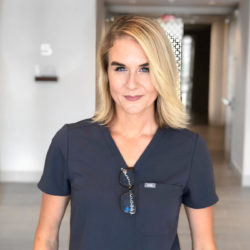(This article originally appeared on NurseAbnormalities.com by Danielle LeVeck, DNP)
Let’s face it, nursing can be confusing. There are so many different types of nurses and advanced practice nursing roles. It was so confusing that I wasn’t even sure what my title would be until three months before I graduated. In an effort to decipher the acronyms and make it easier for you, I have tried to organize as many advanced practice nursing roles as possible below and their associated acronyms with an explanation. My apologies if I missed one, but I’m going to give it my best shot.
What Are the Different Types of Advanced Practice Nurses?
Advanced Practice Registered Nurse (APRN)
Advanced Practice Registered Nurse (APRN) is an umbrella term and at the top of the pyramid. This term comprises of the four types of advanced practice nurses: Certified Nurse Practitioners (CNP), Certified Nurse Midwives (CNM), Clinical Nurse Specialists (CNS), and Certified Registered Nurse Anesthetists (CRNA).
Nurse Practitioner (NP)
Nurse Practitioner (NP) is a generic term, but generally, NPs are separated by the populations they treat, and then further by specialty.
Types of Nurse Practitioners
Family Nurse Practitioner (FNP): Before taking a certification exam, or a generic acronym for a Family Nurse Practitioner is FNP.
- If the FNP decided to take her or his certification exam through the American Nurses Credentialing Center (ANCC), the certification awarded would be “Family Nurse Practitioner-Board Certified,” or FNP-BC.
- If you are pursuing this certification, BoardVitals has an ANCC Family Nurse Practitioner Question Bank to help you prepare for the certification exam.
- If the FNP decided to take her or his certification exam through the American Academy of Nurse Practitioners National Certification Board (AANPCB), sometimes referred to as the American Academy of Nurse Practitioners (AANP), the certification awarded would be, “Family Nurse Practitioner-Certified,” or FNP-C.
- If you are pursuing this certification, BoardVitals has an AANP Family Nurse Practitioner Question Bank to help you prepare for the certification exam.
Adult Gerontology Nurse Practitioner (AGNP): Before taking a certification exam, or a generic acronym for an Adult Gerontology Nurse Practitioner is AGNP. To further complicate this, AGNPs can be certified in primary or acute care depending on their education.
- Primary care: If the AGNP decided to take her or his certification exam through the American Nurses Credentialing Center (ANCC) and specialized in primary care, the certification awarded would be, “Adult-Gerontology Primary Care Nurse Practitioner-Board Certified,” or AGPCNP-BC.
- If you are pursuing this certification, BoardVitals has an Adult Gerontology Primary Care Nurse Practitioner Question Bank to help you prepare for the certification exam.
- Primary care: If the AGNP decided to take her or his certification exam through the American Academy of Nurse Practitioners National Certification Board (AANPCB) and, sometimes referred to as the American Academy of Nurse Practitioners (AANP), and specialized in primary care, the certification awarded would be, “Adult-Gerontology Primary Care Nurse Practitioner-Certified,” or AGNP-C.
- If you are pursuing this certification, BoardVitals has an Adult Gerontology Primary Care Nurse Practitioner Question Bank to help you prepare for the certification exam.
- Acute Care: If the AGNP decided to take her or his certification exam through the American Nurses Credentialing Center (ANCC), and specialized in acute care, the certification awarded would be, “Adult-Gerontology Acute Care Nurse Practitioner-Board Certified,” or AGACNP-BC.
- If you are pursuing this certification, BoardVitals has an ANCC Adult Gerontology Acute Care Nurse Practitioner Question Bank to help you prepare for the certification exam.
- Acute care: If the AGNP decided to take her or his certification exam through the American Association of Critical Care Nurses (AACN), and specialized in acute care, the certification awarded would be, “Acute Care Nurse Practitioner Certified – Adult Gerontology,” or ACNPC-AG.
- If you are pursuing this certification, BoardVitals has an AACN Adult Gerontology Acute Care Nurse Practitioner Question Bank to help you prepare for the certification exam.
Pediatric Nurse Practitioner (PNP): Before taking a certification exam, or a generic acronym for a Pediatric Nurse Practitioner is PNP. To further complicate this, PNPs can be certified in primary or acute care depending on their education, like AGNPs.
- Primary care: If the PNP decided to take her or his certification exam through the American Nurses Credentialing Center (ANCC), and specialized in primary care, the certification awarded would be, “Pediatric Primary Care Nurse Practitioner-Board Certified,” or PPCNP-BC.
- Primary care: If the PNP decided to take her or his certification exam through the Pediatric Nursing Certification Board (PNCB), and specialized in primary care, the certification awarded would be, “Certified Pediatric Nurse Practitioner-Primary Care,” or CPNP-PC.
- If you are pursuing this certification, BoardVitals has a Pediatric Primary Care Nurse Practitioner Question Bank to help you prepare for the certification exam.
- Acute care: The Pediatric Nursing Certification Board (PNCB) is the only choice for an Acute Care Pediatric Nurse Practitioner certification. The certification awarded would be, “Certified Pediatric Nurse Practitioner – Acute Care,” or CPNP-AC.
Neonatal Nurse Practitioner (NNP): Before taking a certification exam, or a generic acronym for a Neonatal Nurse Practitioner is NNP.
- NNPs can only certify through the National Certification Corporation (NCC) and the certification awarded would be, “Neonatal Nurse Practitioner-Board Certified,” or NNP-BC.
Women’s Health Care Nurse Practitioner (WHNP): Before taking a certification exam, or a generic acronym for a Women’s Health Care Nurse Practitioner is WHNP.
- WHNPs can only certify through the National Certification Corporation (NCC) and the certification awarded would be, “Women’s Health Care Nurse Practitioner-Board Certified,” or WHNP-BC.
Psychiatric-Mental Health Nurse Practitioner (PMHNP): Before taking a certification exam, or a generic acronym for a Psychiatric Mental Health Nurse Practitioner is PMHNP.
- Across the lifespan: PMHNPs can only newly certify through the American Nurses Credentialing Center (ANCC) and the certification awarded would be, “Psychiatric-Mental Health Nurse Practitioner (Across the Lifespan)-Board Certified,” or PMHNP-BC.
- Of note, the outdated certifications mental health nurse practitioners through the ANCC were divided as adult and family. Those exams are still available for renewal only.
- If you are pursuing this certification, BoardVitals has a Psychiatric-Mental Health Nurse Practitioner Question Bank to help you prepare for the certification exam.
Emergency Nurse Practitioner (ENP): This is the newest NP certification and before taking the certification exam, or a generic acronym for an Emergency Nurse Practitioner is ENP.
- If the ENP decided to take her or his certification exam through the American Nurses Credentialing Center (ANCC), the certification awarded would be the “Emergency Nurse Practitioner, Board Certified,” or ENP-BC.
- If the ENP decided to take her or his certification exam through the American Academy of Nurse Practitioners National Certification Board (AANPCB), sometimes referred to as the American Academy of Nurse Practitioners (AANP), the certification awarded would be, “Emergency Nurse Practitioner – Certified,” or ENP-C.
Nurse Midwife (NM)
Certifying as a Nurse Midwife is fairly straightforward. There is only one certifying body called the American Midwifery Certification Board (AMCB). Once the certification exam is passed and awarded, the midwife will be titled, “Certified Nurse-Midwife,” or CNM.
- If you are pursuing this certification, BoardVitals has a Certified Nurse Midwife Question Bank to help you prepare for the certification exam.
Clinical Nurse Specialist (CNS)
Clinical Nurse Specialist is a generic term, but generally, CNSs are separated by the populations they treat; adult-gerontology, pediatric, and neonatal. CNSs can certify through the American Nurses Credentialing Center (ANCC) or the American Association of Critical Care Nurses (AACN). Once certified, some CNSs will simply use “CCNS,” to indicate they are “Certified Clinical Nurse Specialists.”
Adult-Gerontology Clinical Nurse Specialist (AGCNS): The AGCNS can obtain a certification through the ANCC or the AACN.
- If the AGCNS decided to take her or his certification through the American Nurses Credentialing Center (ANCC), the certification awarded would be the “Adult-Gerontology Clinical Nurse Specialist-Board Certified,” or AGCNS-BC.
- If the AGCNS decided to take her or his certification through the American Association of Critical Care Nurses (AACN), the certification awarded would be “Acute Care Clinical Nurse Specialist-Adult Gerontology,” or ACCNS-AG.
Pediatric Clinical Nurse Specialist (PCNS): The PCNS can obtain a certification through the AACN.
- If the PCNS takes her or his certification through the American Association of Critical Care Nurses (AACN), the certification awarded would be “Acute Care Clinical Nurse Specialist-Pediatric,” or ACCNS-P.
Neonatal Clinical Nurse Specialist (NCNS): The NCNS can obtain a certification through the AACN.
- If the NCNS takes her or his certification through the American Association of Critical Care Nurses (AACN), the certification awarded would be “Acute Care Clinical Nurse Specialist-Neonatal,” or ACCNS-N.
Certified Registered Nurse Anesthetist (CRNA)
Certifying as a Nurse Anesthetist can only be done through the National Board of Certification and Recertification for Nurse Anesthetists (NBCRNA). Once the exam is passed the certification awarded is a Certified Registered Nurse Anesthetist or CRNA.
This post concludes the acronyms for APRNs. It took me nearly four years to figure this out. I hope you learn a lot faster than I did. Best of luck to all of you on your journey to becoming an APRN.
Find out what the highest paying nursing specialties are and learn more about the CE requirements for RNs and NPs in my other blog posts.





